#zollo
Text
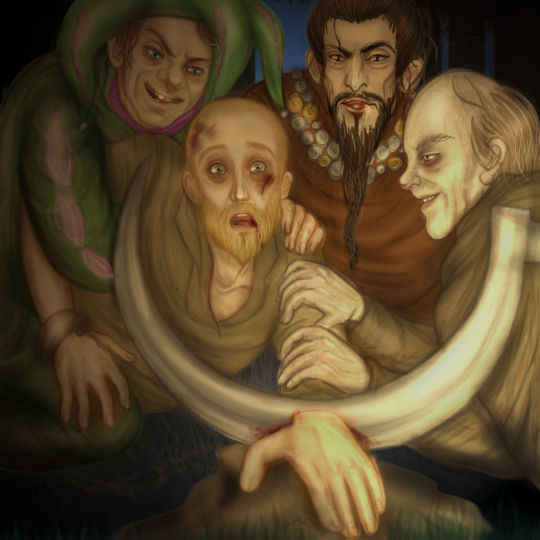
Jaime loses his sword hand
They mean to scare me.
The fool hopped on Jaime’s back, giggling, as the Dothraki swaggered toward him.
The goat wants me to piss my breeches and beg his mercy, but he’ll never have that pleasure.
He was a Lannister of Casterly Rock, Lord Commander of the Kingsguard; no sellsword would make him scream.
Sunlight ran silver along the edge of the arakh as it came shivering down, almost too fast to see.
And Jaime screamed.
~A Storm of Swords (Jaime III)
By Hed-ush
#a song of ice and fire#a storm of swords#jaime lannister#the brave companions#vargo hoat#shagwell the fool#urswyck#zollo#fanart#deviantart
60 notes
·
View notes
Text
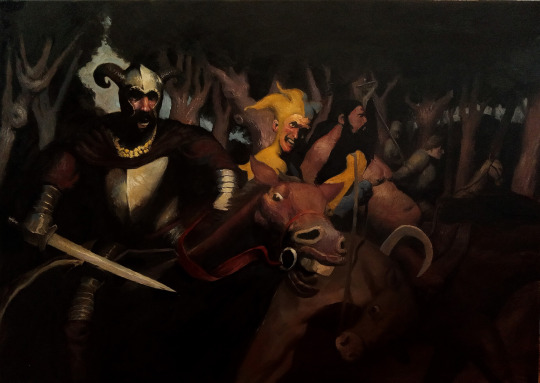
The Brave Companions by Caterina Gerbasi
3 notes
·
View notes
Text

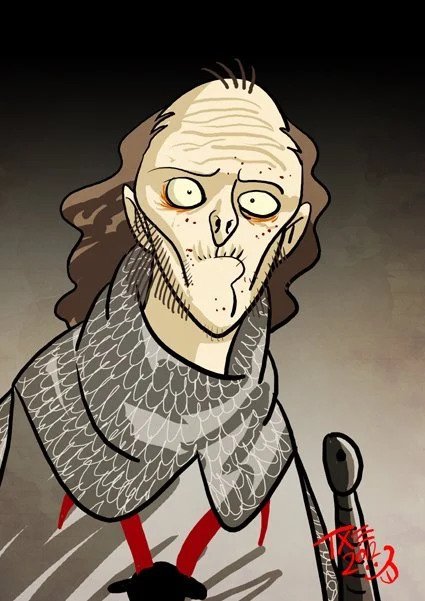


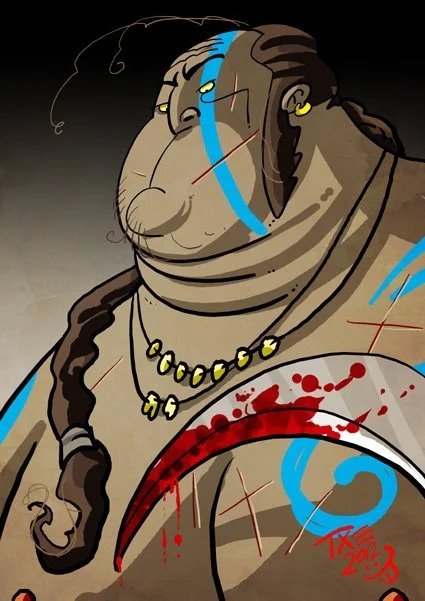
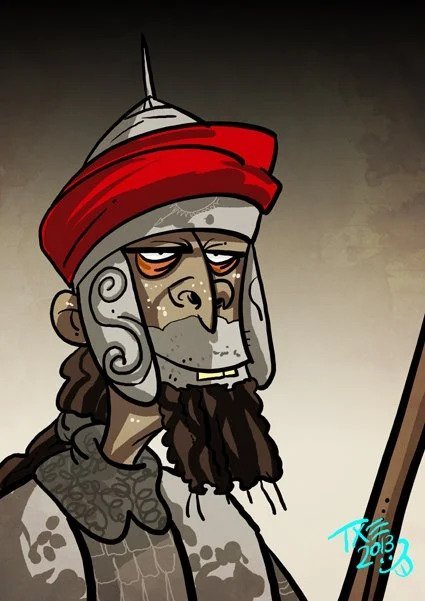
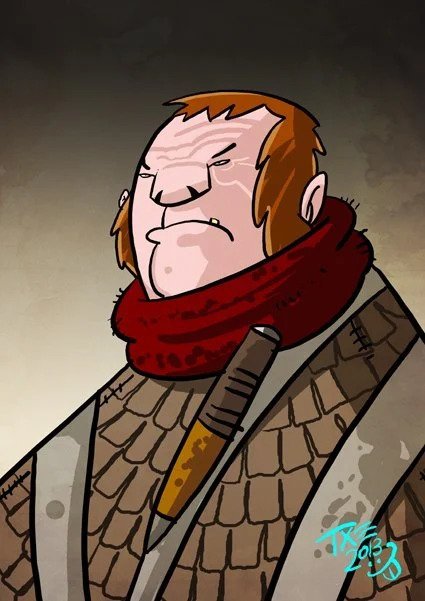

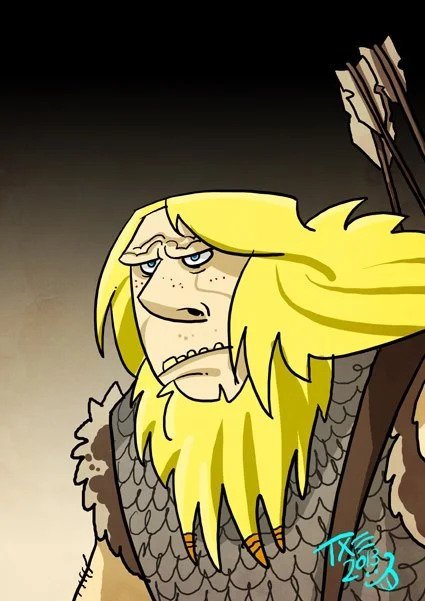

#art reblog#themico#brave companions#bloody mummers#not mine#vargo hoat#urswyck the faithful#septon utt#shagwell#zollo#timeon#pyg#iggo#togg joth#three toes#a clash of kings#a storm of swords#harrenhal#a song of ice and fire art#valyrian scrolls art
4 notes
·
View notes
Text

Sunday 17 December Mixtape 405 “Mind Flow”
Multi Genre, Electroacoustic, Ambient, Electronic, Trevlad Sounds
Wednesdays & Sundays.
Support the artists and labels.
Don't forget to subscribe so future shows can bloom.
https://linktr.ee/trevlad
Trevlad Sounds-Welcome in you wonderful listener 00:00
Der Elektrische Traum-Continuum Flow 00:31
6WX_O-Enter the waterfall 06:27
Don Leisure, Amanda Whiting-Beyond The Midnight Sun 08:38
Off Land-Skyquakes 11:20
The Central Office of Information-The Mental Cupboards Of My Mind 16:07
Pietro Zollo-April — part 3 18:03
Imrryr-1st 36:53
Hello Meteor-Gravity Yellow 40:18
36-Ghostfields 43:12
Apta-Submerge 46:42
#Der Elektrische Traum#Lighten Up Sounds#6WX_O#Don Leisure#Amanda Whiting#First Word Records#Off Land#Fantasy Enhancing#The Central Office of Information#Woodford Halse#Pietro Zollo#Projekt Records#Imrryr#Hello Meteor#36#Apta#Castles In Space#Trevlad Sounds
2 notes
·
View notes
Text
‘Till’ Review: He Was Someone’s Son, Too
Chinonye Chukwu’s new film reminds us that before his gruesome murder galvanized a civil rights movement, Emmett Till was a 14-year-old boy with a doting mother.
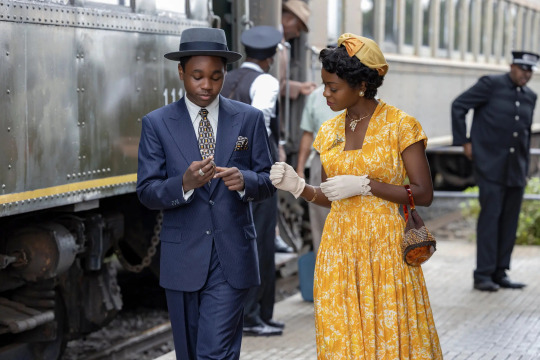
Jalyn Hall as Emmett Till and Danielle Deadwyler as his mother, Mamie, in “Till.”Credit...Lynsey Weatherspoon/Orion Pictures
By Manohla Dargis
Published Oct. 13, 2022
Updated Oct. 16, 2022
Some stories can seem too difficult to tell, though that doesn’t seem to have crossed the mind of the director Chinonye Chukwu. In “Till,” her haunted and haunting movie about Emmett Till, the 14-year-old whose barbaric murder in Mississippi in 1955 by white supremacists helped galvanize the civil rights movement, Chukwu revisits the past while doing something extremely difficult. She makes this grim American history insistently of the moment — and she does so by stripping the story down to its raw, harrowing emotional core.
In brisk strokes both sweeping and detailed, Chukwu — who shares the script credit with Michael Reilly and Keith Beauchamp — revisits Till’s life, winding back the clock to Chicago in 1955. There, the cherubic-faced Emmett (a tender Jalyn Hall) lives with his widowed mother, Mamie (a superb Danielle Deadwyler), in a cozy house and is eagerly preparing to visit relatives in Mississippi, a trip that hangs over his mother like a worrying cloud. Yet Mamie dotes on Emmett (she calls him Bo) and, as a gift, buys him a wallet at a department store, where she tartly rebuffs a white salesclerk who tries to steer her toward the basement.
By the time that Emmett is riding a train to the South — midway through the trip, the Black passengers stand and move en masse to the rear — a divided world of post-World War II optimism and jarring racial segregation has opened up. These divisions widen once Emmett arrives in Mississippi, where he stays with the family of Mamie’s uncle, a sharecropper, Moses (John Douglas Thompson). Soon, Emmett is helping Moses and his children pick cotton under the relentless sun — the palette suggestively lightened — and the camera sweeps over Black bodies toiling in the field as Antebellum America comes to unsettling life.
The horrors of that world soon emerge with devastating consequences. Emmett, along with some relations, visits a small grocery store that caters to Black customers but is run by white people. Things rapidly spiral downward when Emmett walks into the store and meets the contemptuous gaze of the woman behind the counter. The Northern salesclerk who insulted Mamie earlier was just a better-mannered racist; he was also an ugly foreshadowing. Now, away from Mamie and the life he knows, Emmett amiably tries to engage the woman, Carolyn Bryant (Haley Bennett), whose hostility ends in catastrophic violence. That evening, several white men kidnap, torture and murder Emmett, throwing his mangled body in a river.
Chukwu doesn’t show Till’s torture and death, a decision that is a clear, emphatically ethical artistic choice. “Till” is the third feature-length movie that she has directed, the latest following her 2019 drama “Clemency,” about a Black prison warden in crisis, and her work here is impressive. She handles the larger-scale period backdrop of “Till” and sprawling cast with confidence, using her expanded tool kit prudently and without sacrificing the intimacy that helped distinguished “Clemency.” And, just as she did in that drama, which was at once anchored and elevated by Alfre Woodard’s powerful lead turn, Chukwu distills a story — its gravitational force and emotional depths — into the movie’s central performance.
With fixed intensity and supple quicksilver emotional changes, Deadwyler rises to the occasion as Mamie, delivering a quiet, centralizing performance that works contrapuntally with the story’s heaviness, its profundity and violence. The weight of Emmett Till’s murder, the horror of it — as well as both the history that preceded his death and that which followed it — is monumental, impossible, really, for one movie. Rather than attempt to convey that significance in its full sweep, Chukwu condenses it into meaningful details, fugitive moments, tranquil ellipses, explosive gestures and, especially, the face of one woman in joy and in agony.
Chukwu keeps focused on Mamie even as the world presses in, including after Emmett’s death when she’s swept up in a larger national drama and arranges an open-casket funeral — a bold, far-reaching decision — and then later travels from Chicago to Mississippi to attend the trial of his murderers. During the trial, a grotesque sham, reporters swarm, flashbulbs pop and highlighted figures enter and exit, including Medgar and Myrlie Evers (Tosin Cole and Jayme Lawson). The movie doesn’t go deep into the era’s policies and politics, but while the trial unfolds it sometimes slips into explanatory, near-pedagogical mode, including in some scenes that seem more for the viewer’s (perhaps white viewer’s) benefit than for the actual story.
In the decades since he died, Till’s murder and the still-shocking photographs of his body have been the subject of innumerable news stories, scholarly articles, nonfiction books, novels, poems, documentaries, podcasts, websites and exhibitions. At the 2017 Whitney Biennial, a painting of his corpse by the white artist Dana Schutz drew protests and criticism from Black artists. Historical markers installed in Mississippi that designate significant locations in his murder have been repeatedly vandalized. And, in March, Congress finally approved a bill — known as “the Emmett Till Antilynching Act’’ — making lynching a federal hate crime. Nearly 70 years after his death, his legacy and body remain contested ground.
Perhaps that’s why I keep returning to the image of Mamie with her mother, Alma (Whoopi Goldberg), who’s sitting near-immobilized with grief after his death. Alma’s limbs hang heavily, as if they had turned to lead, an image that mirrors Jesus as the Man of Sorrows and summons up visions of other grieving Black families. Here, as elsewhere, including the scene of Mamie with Emmett’s corpse that evokes innumerable pietàs, the sanctity of these bodies is as undeniable as their humanity. In the end, what makes “Till” cut deeply is Chukwu’s insistence that before Emmett was a victim of pathological racism and an emblem for change, he was a boy, a friend, a cousin, a grandson and Mamie’s son — a beautiful, loving and loved child.
Till
Rated PG-13 for racist violence and language. Running time: 2 hours 10 minutes. In theaters.
#Chinonye Chukwu#Michael Reilly#Keith Beauchamp#Barbara Broccoli#Whoopi Goldberg#Thomas Levine#Frederick Zollo#Danielle Deadwyler#Jalyn Hall#Frankie Faison#Haley Bennett#Bobby Bukowski#Ron Patane#Abel Korzeniowski
3 notes
·
View notes
Text
How does a false prophet rise to power?
In 1919 Brooklyn, Giuseppina Carbone is another racially suspect “dark white” immigrant with empty pockets and waning faith in the indifferent-to-hostile ’merigan Catholic Church. The staid Irish priests don’t want to hear about mysticism—the nerve of these “guineas” to worship La Madonna Nera when everyone knows the Virgin Mary is as white as fresh Irish cream! Being southern Italian is the original sin that can’t be baptized away, even when Giuseppina and Filippo christen their two-year-old daughter at Our Lady of Loreto, the rare Brooklyn Catholic church built by and for Italian immigrants.
Filippo is a laborer making $1.50 a day. Like many immigrant women, Giuseppina takes on piecework, in her case paid by the buttonhole. At least she works from home rather than in a tinderbox of a factory. Not long ago, on a clear, cold day in March 1911, the Triangle Shirtwaist Factory fire killed 146 garment workers in Manhattan. Giuseppina resembles the mostly Italian and Jewish teenagers and young women who jumped to their deaths to escape the smoke or succumbed inside the factory’s locked doors, a so-called loss-prevention measure. She is dark-haired, dark-eyed, and just five feet tall. Her daughter may soon eclipse her. At almost nine years old, Caterina—“Catherine, Mamma!”—can read and write English, courtesy of P.S. 178.
Giuseppina cannot expect much from life, until she hears Sister Josephine Zollo’s Italian sermons wafting through the air as she walks home one day, or a neighbor eagerly repeats them to her. Giuseppina’s mother tongue cleanses her like a newborn kitten. Salvation, she is told, can be hers.
A Pentecostal awakening has been sweeping across America for a decade. In early April 1906, Brother William Joseph Seymour, the Catholic-reared son of formerly enslaved parents, moved his rapidly expanding prayer meetings into a run-down building on Azusa Street in Los Angeles. By then, he and his followers were speaking in tongues—a sign, they believed, of internal salvation, or “baptism in the Holy Spirit.” Seymour’s religious creation would be emulated, imitated, or appropriated, depending on who’s telling the story of its spread. In Chicago, Luigi Francescon and Pietro Ottolini spearheaded the world’s first Italian Pentecostal church, and before long the faith reached Brooklyn. Perhaps the promise of un miracolo drew Josephine Zollo to Brooklyn City Mission, a Pentecostal church in East New York. She had been ill before she first attended a service there in 1912. Whatever happened that day, Josephine’s health soon improved. She decided that the Lord had healed her body and saved her soul.
— The Shadow and The Ghost
#christine grimaldi#the shadow and the ghost#history#religion#christianity#catholicism#pentecostalism#cults#racism#labour#employment#la cappella dei miracoli#usa#italian americans#african americans#josephine carbone#josephine zollo#william j. seymour#luigi francescon#pietro ottolino
3 notes
·
View notes
Text
youtube
Drag Race Germany 106 Snatch Game
The queens compete in a makeup mini challenge and play the Snatch Game. Dinner is served on the runway.
0 notes
Text
0 notes
Link
#Psicologo italiano online#Psicoterapeuta italiano online#Psicologo italiano in UK#Psicoterapeuta italiano virtuale#Psicologo italiano virtuale#counselling online#psicoterapista italiano a londra#counselling italiano a londra#psicoterapeuta italiano a londra#psicoterapeuti italiano a londra#edoardo zollo#italia psicoterapeuta on line#ED-COUNSELLING ONLINE#Online Counselling#Online counselling uk#Online counselling london#online italian counselling
0 notes
Text
kind of fun that the brave companions jaime threatens "to pay his debt to" when he leaves harrenhal are the ones brienne ends up killing in feast (+ zollo but ¯\_(ツ)_/¯). it still seems deliberate especially since this is the only time pyg is mentioned in asos
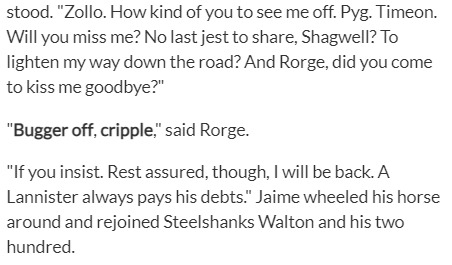
59 notes
·
View notes
Text
Maelys I Blackfyre, Captain General of The Golden Company
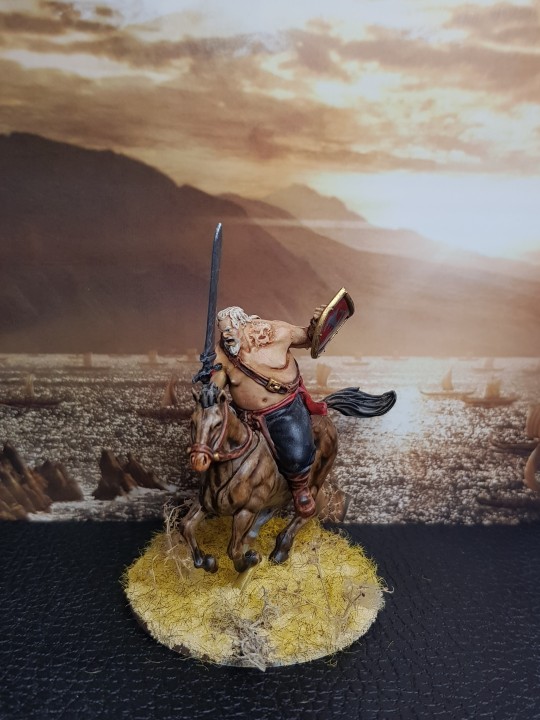
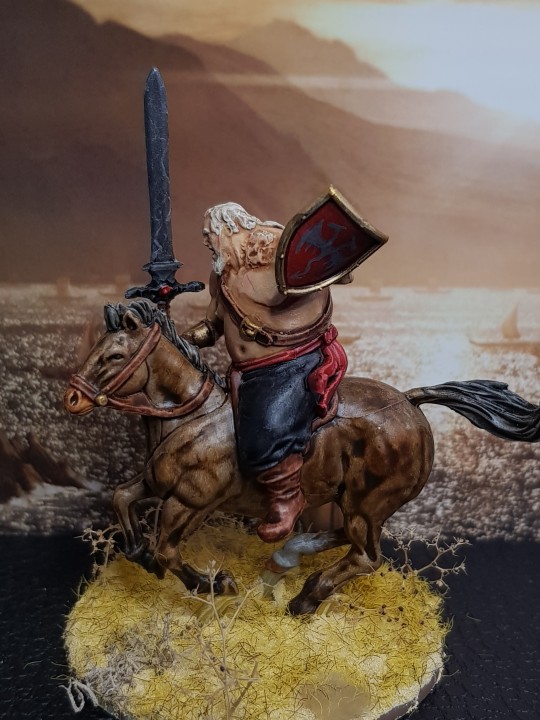
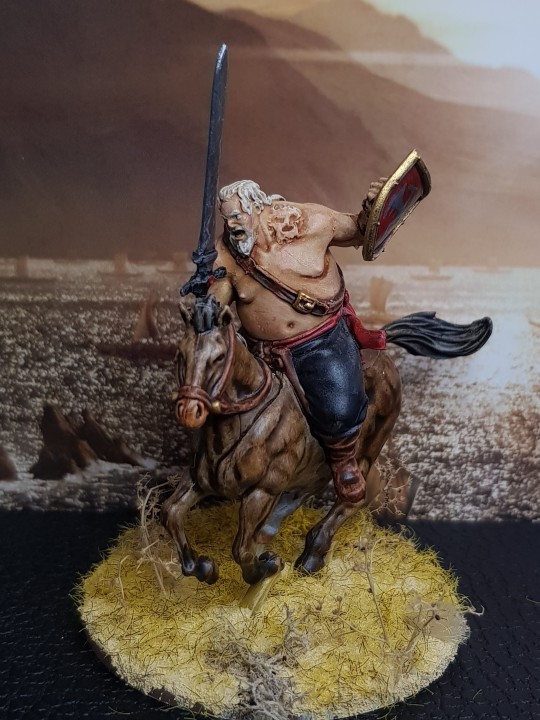




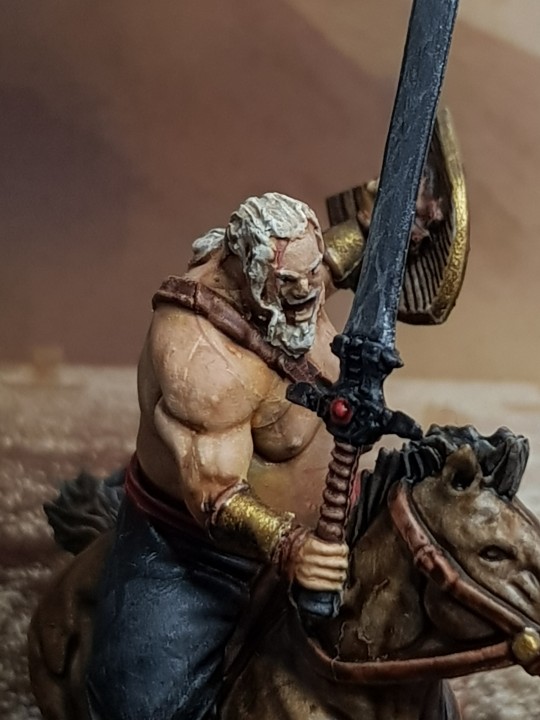
"The captain-general's tent was made of cloth-of-gold and surrounded by a ring of pikes topped with gilded skulls. One skull was larger than the rest, grotesquely malformed. Below it was a second, no larger than a child's fist. Maelys the Monstrous and his nameless brother."
I'm ashamed to say Maelys is a character I'd largely written off as a "mummer's dragon", a cartoonishly evil horse-punching cousin-killing giant to give the Westerosi Greatest Generation a monster to slay. It was only thanks to the great analysis by @mylestoyne I really considered that Maelys is largely a character in Tyrion's chapters, so of course he's a reflection of Tyrion's themes - even with all the hallmarks of Westerosi martial masculinity, he's utterly reviled for being disabled and for "kin-slaying" in utero.
The miniature is adapted from a Bloody Mummer, presumably Zollo - I really love him for the big beefy look, George's giant characters generally give the impression of Andre the Giant style gigantism, with plenty of fat over their musculature. I of course added the second head, my sculpting skills are rusty to say the least, but I certainly prefer the vestigial look to some of the cartoony "second smaller perfectly formed head" art I've seen out there. I've also given him Blackfyre, which I always like to picture as a full fantasy type sword.
#asoiaf#asoiaf fanart#miniatures#minis#a song of ice and fire#valyrian scrolls#cmon#maelys blackfyre#maelys the monstrous#war of the ninepenny kings#annoyingly this mini was the first i got with some production defects#his hair and some of the scars are to cover for that#thw two headed blackfyre sigil ive seen in a few places and love it
98 notes
·
View notes
Text
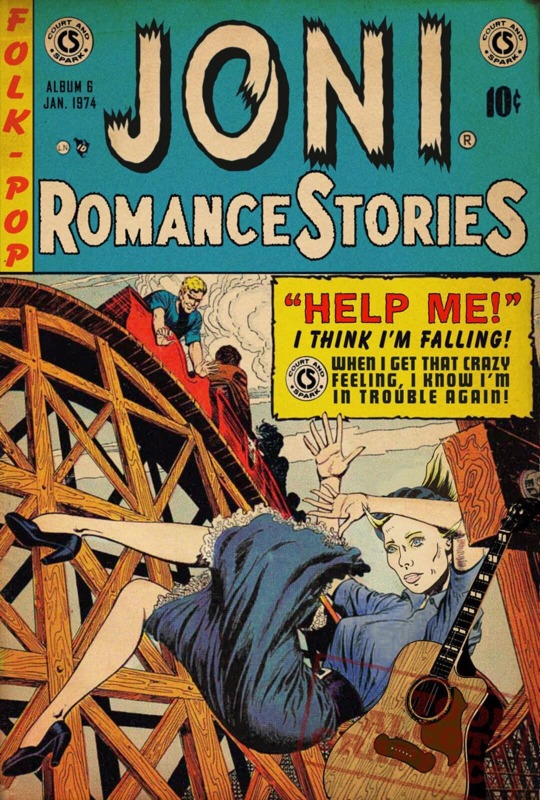
AUDIO STORY
The Emergence of Joni Mitchell
"The Emergence of Joni Mitchell," is a two-hour examination of one of the most heralded songwriters of her time. In this third installment of his series on the seminal work of important figures in popular music, Ingles and his guests explore how Joni Mitchell crafted her artistry and connected with audiences over four decades. Mitchell put the experience of being a woman and being human on artful display through her blatantly honest and confessional lyrics, innovative open guitar tunings and jazz-inflected vocals. The program focuses on Mitchell's key releases to illuminate the musicianship of the woman "Rolling Stone" called "one of rock's most daring and uncompromising innovators."
By mixing Mitchell's music from these pivotal moments with informed commentary from musicians, fans, music critics and archival interviews with Mitchell herself, "The Emergence of Joni Mitchell" articulates what music lovers have found so compelling about this thoughtful and innovative writer and performer. Over 50 Mitchell songs are featured. Special guests include music writers Ann Powers, Anthony DeCurtis, Paul Zollo, Lydia Hutchinson and Holly George-Warren. Also featured are musicians Shawn Colvin, Lucy Kaplansky and others.
The two hour version is adaptable to a newscast necessary clock.
12 notes
·
View notes
Text

Slow Ambient Drift
Wednesdays, Fridays & Sundays.
Support the artists and labels.
Don't forget to tip so future shows can bloom.
Tracklist with album links and time stamp.
Wings Of An Angel-Give Me Something To Believe In (Part 2)-00:00
Pauline Anna Strom-Gossamer Silk-02:55
IDRA-People of Saigon-08:12
Robohands-For the Different-11:48
Warrington-Runcorn New Town Development Plan-The Five Minute City-12:31
Pietro Zollo-Another Day-16:24
david rothbaum-11.17.19-23:00
Jogging House-Gardens-23:57
dogs versus shadows-Howzat-30:54
Bahía Mansa-Papaver Somniferum-31:16
WMD-Effervescent-35:12
Suso Sáiz & Suzanne Kraft-Nunca-36:26
Brómus & Nolan Bearden-Gentle Flight-41:15
#Wings Of An Angel#Pauline Anna Strom#RVNG Intl#IDRA#Pitch The Noise#Robohands#Bastard Jazz Records#Warrington-Runcorn New Town Development Plan#Moonbuilding#Castles in Space#Pietro Zollo#Neotantra#david rothbaum#Mystery Circles#Jogging House#dogs versus shadows#Subexotic Records#Bahía Mansa#WMD#Suso Sáiz & Suzanne Kraft#Music from Memory#Brómus & Nolan Bearden#ambient#relax
1 note
·
View note
Note
Sansa and Bran were abused and almost killed by Hound and Jaime. They were so traumatized that they had nightmares. Yet certain fans(Sansan&Braime) want these kids to forget them and make them their ally or love interest.
I mean, fans are free and welcome to want what they want.
I personally just don't think it's very likely to be where GRRM is taking these characters in canon.
I doubt he gave us Gregor Clegane screaming away the last days of his life in absolute agony only to be turned into a zombie "doll knight" (like the kind he disfigured Sandor for) in order to set the stage for a different group of (almost) child killers who also don't actually regret anything to get a happy ending recognciled with their victims, or a sanitized romantic conclusion to their attempted sexual assault on a preteen.
Jaime is unlikely to ever meet Bran again. He lost his hand, in a move that was as casual to Zollo as throwing Bran was to Jaime. His story is with Catelyn now, and it is with Cersei and his own doomed children. If Brienne intersects with Bran and the other Starks down the line, it's unlikely to be with Jaime in tow. Her story didn't begin with him, and it won't end with him, either.
If Sandor emerges from his little cocoon of atonement, it's unlikely to be for a happier reward. The Elder Brother served in silence for ten years before even speaking again, and Sandor is supposed to spend a gap year shoveling dirt and it's bygones? Hardly.
29 notes
·
View notes
Text
19 notes
·
View notes
